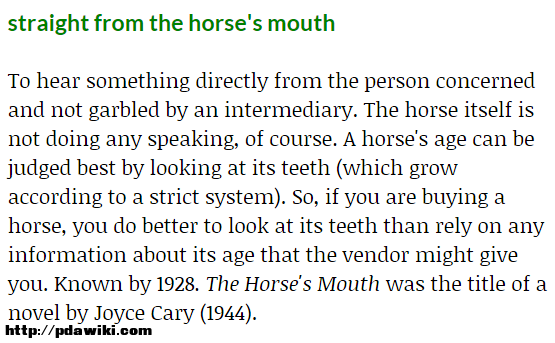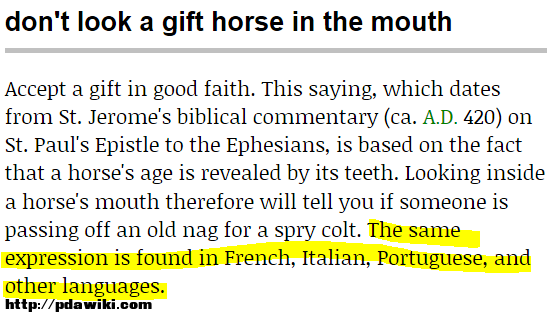|
|
本帖最后由 eeshu 于 2017-7-28 07:54 编辑 # p- J+ ~2 U: h
6 q" Q W/ F" D. a3 |昨天有好友问为什么“消息可靠”与马嘴相关。我凭印象回答“据说可以通过马齿判断其年龄”。今天又想起了另一个习语. A' L* b6 v$ q- l- [' Y2 v3 H) A
don't look a gift horse in the mouth,道理应该也是一样。但毕竟只是猜测,所以仔细查了查,有几处解释。先看straight from the horse's mouth。Cassell's Dictionary Of Word And Phrase Origins和The Facts On File Encyclopedia of Word and Phrase Origins都解释了该习语的来源,和我的说法相符,请看:
9 y. ^( H$ C& M& D* B
, S& Y+ q+ g4 `+ Y! ~5 V: X' ] - Q/ `' X) `, j9 `2 W7 d0 T; Y - Q/ `' X) `, j9 `2 W7 d0 T; Y
5 W6 [# c- [' O8 d9 @/ p
" D' L$ K) E7 r7 Y% I ]5 f6 y; a
( D6 ^3 h$ ]8 t! b$ J( `$ }$ }$ l# X* _+ U4 \ ~
再看don't look a gift horse in the mouth。这个有解释的就更多了。除了The Facts On File Encyclopedia of Word and Phrase Origins,Farlex Dictionary of Idioms 与Colloquialisms,The Dictionary of Clichés,Urban Dictionary都收了该习语的语源信息。Farlex的写得比较简单:4 z8 ]' M# G4 \; i, T5 w* c
) _" m( j( Z- i' L
4 l! v% p! I$ i: g; n; l4 J
; A5 B. k+ X N" A4 ]+ T' s
7 L1 `( e9 H7 n; uFacts On File一如既往的详细:0 Q' x$ `# b& ?2 p+ u
0 n! `4 i) \ v0 p y3 e$ K 5 g- @) |; e8 x/ s5 _3 U) L: L 5 g- @) |; e8 x/ s5 _3 U) L: L
% K9 N5 ]/ r W4 @: G
不过,我以为该词条解释得最清楚的要数Christine Ammer的The Dictionary of Clichés。不但给出了语源,还说其他欧洲语言中也有类似习语。' \! ~7 @- r1 S+ S
% p2 _; V& C9 |6 P; E/ Y

% G) r' ^0 k& q+ S4 S+ S1 D
, f( u0 ~5 y6 p# l+ U" K; ~) L虽然说习语的来源往往充满了故事性,容易有争议。但若有几条相关相似的习语指向同一来源,可靠性应该高出不少了吧。
8 P) ~' ^% |' u! Y Q6 s$ L& \: f# C
9 f; V: t' P2 Z+ E A* G( s, w
写完后,发现phrases.org.uk上有更加详细的信息,贴来给大家看看:6 g( r) i* f2 j& i2 y& t
) }, O. H8 L: W) t- Don't look a gift horse in the mouth
8 ^- ~5 r1 c3 E3 f/ ^+ ^* v {2 U
, S# Y" |4 \7 c$ KMeaning
- W" o) R7 q) t8 U9 QDon't be ungrateful when you receive a gift.
4 v( G) W# Z; `# j9 L
. `' Y+ ]1 ]1 B9 j: w' p# c7 [Origin
9 N+ |; x* G5 q! xProverbs are 'short and expressive sayings, in common use, which are recognized as conveying some accepted truth or useful advice'. This example, also often expressed as 'never look a gift horse in the mouth', is as pertinent today as it ever was.
" ?. l) C6 m" j* K' M( a5 }2 @. L" F0 W; j& S# ]" {. {
don't look a gift horse in the mouthAs horses develop they grow more teeth and their existing teeth begin to change shape and project further forward. Determining a horse's age from its teeth is a specialist task, but it can be done. This incidentally is also the source of another teeth/age related phrase - long in the tooth.
( u p; }, E0 t' x( o/ e$ s
5 a# g9 Q& {, ^( o/ kThe advice given in the 'don't look...' proverb is: when receiving a gift be grateful for what it is; don't imply you wished for more by assessing its value.
- @- A/ z3 |7 }1 N* f- C: E
9 s+ C" S& R3 G: ^: R4 ?As with most proverbs the origin is ancient and unknown. We have some clues with this one however. The phrase appears in print in English in 1546, as "don't look a given horse in the mouth", in John Heywood's A dialogue conteinyng the nomber in effect of all the prouerbes in the Englishe tongue, where he gives it as:3 S1 q4 r" d5 Y+ i; h# |$ g
( `5 N( @% Y& O) B2 o
"No man ought to looke a geuen hors in the mouth."
1 n q: x; X6 q& A
/ w( l7 E4 E2 B6 n3 VIt is probable that Heywood obtained the phrase from a Latin text of St. Jerome, The Letter to the Ephesians, circa AD 400, which contains the text 'Noli equi dentes inspicere donati' (Never inspect the teeth of a given horse). Where St Jerome got it from we aren't ever likely to know.
; l C% X0 S, x& ?! Q4 o: a
% Z$ Y( F' z% |8 E7 x$ OHeywood is an interesting character in the development of English. He was employed at the courts of Henry VIII and Mary I as a singer, musician, and playwright. His Proverbs is a comprehensive collection of those sayings known at the time and includes many that are still with us:
* A' A& H2 a- }! }0 z* {* l7 U
+ S( w8 J. j# C- Many hands make light work' I: F8 `4 p, c
- Rome wasn't built in a day
1 r6 c$ @" t2 b' ?" ~- A good beginning makes a good ending
- H. K8 N6 y- p2 P5 p" k- ?. A' G9 M _: l7 k# e! \& n
and so on. These were expressed in the literary language of the day, as in "would yee both eat your cake, and have your cake?", but the modern versions are their obvious descendents.
( Q6 l8 R2 R3 z1 K0 L a" R: ~7 q4 x
We can't attribute these to Heywood himself; he collected them from the literary works of the day and from common parlance. He can certainly be given the credit for introducing many proverbs to a wide and continuing audience, including one that Shakespeare later borrowed - All's well that ends well.5 } u5 Q5 C, }$ c3 ]+ w
& N x1 G6 D1 a" o
6 R4 }* p( `/ i' c8 J+ y) Z! R+ Z( M: W9 Q; K7 ~2 W
- Straight from the horse's mouth
. q; G% a: L2 L8 |. c9 T
3 h$ S2 Q& Q% ?, U! C# ^" l) FMeaning
2 v1 Y, W2 e7 G+ Z7 t, v! ]' RFrom the highest authority.
- X) s+ M6 U2 _0 b @) E5 W5 E0 q$ }: k9 x9 Y5 H" v8 e
Origin
; T" b: I3 W7 u4 K6 Q, wIn horse racing circles tips on which horse is a likely winner circulate amongst punters. The most trusted authorities are considered to be those in closest touch with the recent form of the horse, that is, stable lads, trainers etc. The notional 'from the horse's mouth' is supposed to indicate one step better than even that inner circle, that is, the horse itself.* C$ d1 u5 t: B* ~: M( `6 j7 ^: h/ @4 |
6 p7 O0 ]% y$ B) T3 |6 D$ E! L* U- D9 ddon't look a gift horse in the mouthIt is a 20th century phrase. The earliest printed version I can find of it is from the USA and clearly indicates the horse-racing context - in the Syracuse Herald, May 1913:' n# M& S! f# ^9 U
5 s) X7 g4 R# M U9 m' |0 b
"I got a tip yesterday, and if it wasn't straight from the horse's mouth it was jolly well the next thing to it." |
本帖子中包含更多资源
您需要 登录 才可以下载或查看,没有账号?免费注册

x
|